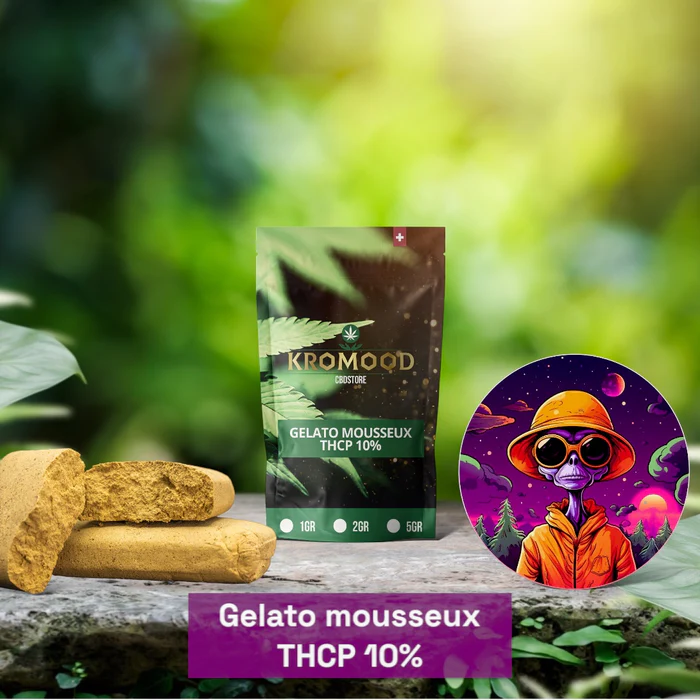
THCP resin - Sparkling Gelato 10%
Livraison en 24 heures avec suivi
THCP Resin - Sparkling Gelato 10%: A Powerful Concentration of Cannabis Excellence
Explore new cannabis heights with our Sparkling Gelato THCP Resin at 10%. This exceptional creation offers a powerful concentration of the excellent Gelato Mousseux variety, for an intense and unforgettable resinous experience.
Characteristics of Sparkling Gelato Resin:
-
10% THCP Concentration: Sparkling Gelato Resin offers you an exceptional concentration of THCP, immersing you in a world of cannabis potency.
-
Intensified Aromas: The characteristic aromas of Sparkling Gelato are intensified in this resin, creating a rich and captivating olfactory experience.
-
Smooth Texture and Easy Handling: The smooth texture of the resin makes it easy to use, whether you prefer to vaporize it, dab it or add it to your joints.
Powerful Effects Associated with Sparkling Gelato Resin:
-
Deep Euphoria: Sparkling Gelato Resin with 10% THCP is known to induce deep euphoria, providing an intense psychoactive experience.
-
Total Relaxation: Immerse yourself in total relaxation that soothes the body and mind, creating a feeling of harmony and well-being.
-
Creative Stimulation: Some users report creative stimulation, ideal for those looking to unleash their creativity under the influence of THCP.
-
Stress and Anxiety Relief: The relaxing effects of the resin can contribute to the relief of stress and anxiety, providing a quiet break from your day.
Whether you are an experienced enthusiast or a curious novice, THCP Sparkling Gelato Resin 10% invites you to an exceptional resinous experience. Unleash the power of THCP with this intense concentration of the Gelato Mousseux strain. Order now for a bold exploration of the cannabis potential of this unique resin.
What is THCP?
THCP, also known as tetrahydrocannabiphorol, is a relatively new cannabinoid that was discovered in the cannabis plant. It stands out for its complex chemical structure and potential potency compared to other cannabinoids such as THC and CBD.
THCP is considered one of the most potent cannabinoids discovered to date, with a much higher affinity for the human body's cannabinoid receptors than THC. It is said to have a stronger affinity for CB1 receptors than THC, meaning it binds more tightly and potentially with greater intensity.
Due to its potential potency, THCP is attracting growing interest in medical research and therapeutic applications. It is thought that it may have more pronounced analgesic effects than THC, which could benefit patients requiring greater pain relief. However, it is important to note that research on THCP is still limited and its exact effects on the human body require further exploration.
Does THCP get you high?
THCP is a cannabinoid that is closely related to THC, but it is important to note that the effects of THCP on the body are not yet fully understood. Although some research suggests that THCP may have a stronger effect on the body due to its higher affinity for cannabinoid receptors, there is not enough evidence to say for sure whether it causes a "high." or a feeling of euphoria similar to THC. Further research is needed to better understand the specific effects of THCP on the human body.
THCP in Belgium and France: Legality and regulations concerning the cannabinoid
In Belgium and France, regulations regarding THCP and other cannabinoids are based on the content of THC, which is the psychoactive substance present in cannabis. As long as the level of THC in a cannabis product, including THCP, is below 0.2%, it is generally considered legal in these countries.
It is important to note that regulations may evolve and vary depending on the specific laws of each country and their interpretations by the competent authorities. It is therefore recommended to keep informed of current regulations and consult official sources for the latest information on the legality of THCP.
In summary, as long as the THC level in THCP products is below 0.2% and they comply with other applicable regulations, they can be considered legal in Belgium and France. However, it is always recommended to comply with local regulations and stay informed of possible changes in legislation.
Livraison depuis nos entrepôts en France
Expédition rapide et fiable
Chez Kromood, nous expédions tous nos colis depuis nos entrepôts situés en France, via Collismo, un transporteur de confiance. Nous collaborons ensuite avec des transporteurs locaux pour vous garantir une livraison rapide et sécurisée dans toute l'Europe. En fonction de votre pays de destination, votre commande sera traitée par le transporteur le plus approprié :
Belgique : La livraison est effectuée par Bpost.
Pays-Bas : Votre colis sera livré par DPD.
Luxembourg : La Poste prend en charge la livraison.
Allemagne : Nous envoyons vos commandes via Deutsche Post.
Autres pays européens : Nous utilisons des partenaires fiables en fonction de votre localisation.
Suivi de colis et options de livraison :
Une fois votre commande expédiée par Collismo, vous recevrez un lien de suivi par email pour suivre l'avancement de votre livraison. Vous pourrez ainsi savoir précisément où en est votre colis, du départ à l’arrivée.
La livraison se fait en 1 à 4 jours ouvrables, selon la destination.
Si vous le souhaitez, certains partenaires locaux comme Bpost (en Belgique) offrent la possibilité de planifier la livraison dans un point relais près de chez vous. Vous pouvez facilement gérer cela via le lien de suivi reçu par email lorsque votre colis arrive dans le pays concerné.
Expédition rapide :
Nous expédions les colis du lundi au vendredi. Toute commande passée avant 09h00 du matin est expédiée le jour même, vous garantissant ainsi une réception rapide de vos produits.
Nous mettons tout en œuvre pour que votre commande arrive dans les meilleures conditions et dans les délais les plus brefs. Si vous avez des questions concernant votre livraison, notre service client est là pour vous aider !
Livraison discrète et neutre
Chez Kromood, nous attachons une grande importance à la discrétion de vos achats. C’est pourquoi nous garantissons une livraison totalement neutre et discrète.
Tous nos colis sont expédiés dans des emballages plaines, sans aucune mention du contenu ni de marque, afin de préserver votre confidentialité.
Vous pouvez donc commander en toute sérénité, sans souci de discrétion.
- Emballage neutre et sans logo.
- Expédition rapide et sécurisée, avec suivi.
- Livraison partout en Europe.
Nous utilisons des services de livraison fiables et réputés pour vous garantir que votre commande arrive rapidement et dans les meilleures conditions.
Paiement sécurisé et neutre
La sécurité de vos paiements est notre priorité.
Chez Kromood, nous utilisons des systèmes de paiement totalement sécurisés afin de vous offrir une expérience d'achat fiable et sans souci. Toutes vos informations de paiement sont protégées grâce à un chiffrement de haut niveau, vous permettant de finaliser votre commande en toute tranquillité.
- Paiements via cartes bancaires, et autres options sécurisées.
- Chiffrement SSL pour protéger vos informations personnelles et financières.
- Transactions sans aucun stockage de vos données bancaires sur notre site.
Paiement discret et sans mention KroMood :
Afin de préserver votre confidentialité, aucune mention de KroMood n'apparaîtra sur vos relevés bancaires.
Méthodes de paiement acceptées :
Nous acceptons actuellement uniquement les cartes bancaires débit ou crédit telles que Mastercard, Visa, et Carte Bleue. Si vous ne possédez pas de carte Mastercard, nous vous conseillons Revolut, qui vous permet d'obtenir une carte virtuelle en quelques minutes, ou bien Bpaid, une carte prépayée Mastercard.
Vous pouvez ainsi payer en toute confiance, en sachant que vos informations sont en sécurité et que votre expérience d'achat reste discrète.
Échantillons Gratuits pour Toute Commande
Chez Kromood, nous souhaitons vous offrir la meilleure expérience possible. C’est pourquoi nous offrons un échantillon gratuit pour chaque commande passée sur notre site. Vous aurez la possibilité de choisir parmi 4 produits exclusifs 10-OH-HHC via un pop-up qui apparaîtra sur votre écran lorsque vous ferez votre commande. Vous pourrez ainsi tester un produit avant de l’ajouter à vos achats futurs !
- Choisissez parmi 4 produits 10-OH-HHC.
- Disponible uniquement lors de votre commande.
- Un pop-up apparaîtra à droite en bas de la page pour vous permettre de sélectionner votre échantillon.
Profitez de cette offre pour découvrir de nouveaux produits et améliorer votre expérience Kromood !

